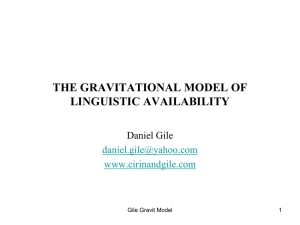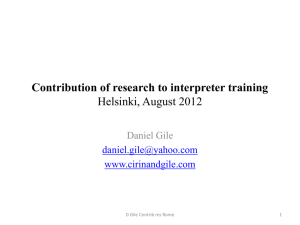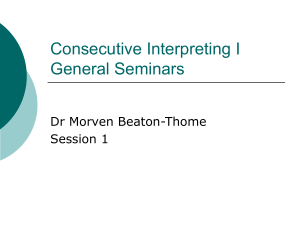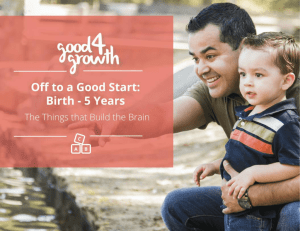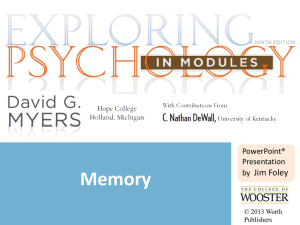System 2
advertisement
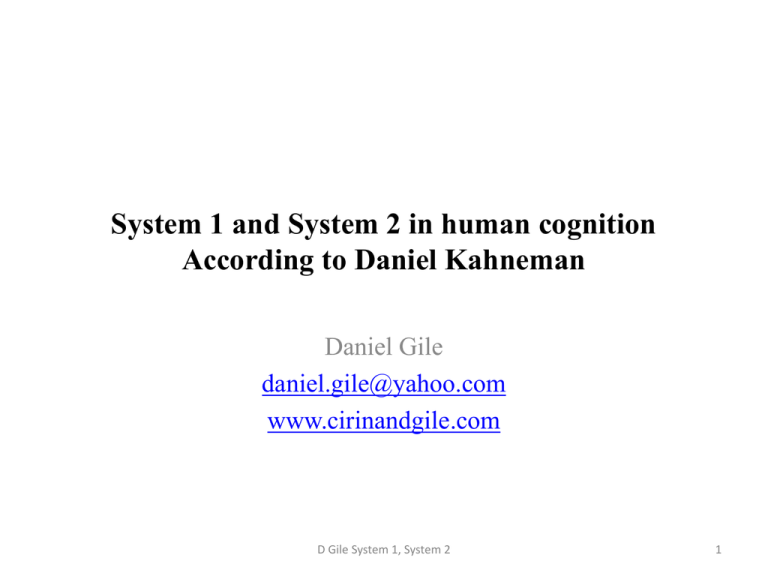
System 1 and System 2 in human cognition According to Daniel Kahneman Daniel Gile daniel.gile@yahoo.com www.cirinandgile.com D Gile System 1, System 2 1 The basics Daniel Kahneman (Thinking fast and slow, Penguin, 2012): Human cognition can be modeled as driven by two “Systems”: (fictitious – no such “systems” exist, but the model works well to explain and predict phenomena) System 1 operates automatically and quickly, with little or no effort and no sense of voluntary control (basically ‘automatic operations’) Most of the time, our cognition is driven by System 1, Rather efficiently System 2 allocates attention to effortful mental activities (basically ‘controlled operations’) It comes in when decisions or actions become complex and need attention, with a feeling of ‘concentration’. It is much slower. D Gile System 1, System 2 2 System 1 – what it does System 1 detects simple relations (“they are all alike”, “the son is much taller than the father”) and excels at integrating information about one thing It effortlessly generates impressions and feelings These are the main source of explicit beliefs and of deliberate choices by System 2 but it does not deal with multiple distinct topics at once nor is it adept at using purely statistical information. For such operations, System 2 comes in D Gile System 1, System 2 3 System 1 – Examples - It can detect that one object is more distant from us then another - It can complete the sentence “Thank you Mister …” - It can answer the question “How much is two plus two?” - If you are French, it can answer the question “What is the capital of France?” - It can drive a car on an empty wide road - It can understand simple sentences - In experts, it can find a strong move in chess Some of these operations are complex, but they have been practiced to such an extent that they are ‘automatic’ for all intents and purposes D Gile System 1, System 2 4 System 2 – What it does with examples Everything that requires attention and is disrupted when attention is drawn away - Focus on the voice of a speaker in a noisy room - Search memory to find the name of a person that you forgot - Keep walking faster than is natural for you - Make sure you behave properly during a job interview - Park in a narrow space - Check that a complex statement is logical In all these situations you must pay attention and will perform less well if your attention is directed inappropriately D Gile System 1, System 2 5 The control of attention The control of attention is shared by the two systems Orienting to a large sound is normally involuntary (System 1) But When it happens, System 2 is immediately mobilized to pay attention to what is going on D Gile System 1, System 2 6 Attention is limited There is a limited amount of attention that you can allocate (deliberately) to activities, And when you try to take more, you fail Effortful activities interfere with each other, So it is difficult or impossible to conduct several at once There is a controversy in psychology as to whether there is one general pool of attentional resources or several distinct pools, in which case one effortful activity does not necessarily interfere with another But it is postulated that similar effortful activities do interfere with each other more than dissimilar activities In interpreting, discourse comprehension and production are probably similar enough to interfere significantly with each other D Gile System 1, System 2 7 System 1 and System 2 working together (1) Both systems are active when we are awake. System 1 runs automatically (no effort) System 2 is in low-effort mode, with a fraction of its capacity being engaged System 1 generates impressions, intuitions, intentions, feelings System 2 generally accepts them System 2 also monitors continuously one’s behavior But when System 1 runs into difficulty, it calls on System 2 to help When a difficult problem is detected When something unexpected or implausible is detected D Gile System 1, System 2 8 System 1 and System 2 working together (2) System 1 cannot be turned off System 1 functions with heuristics: Affect heuristic Availability heuristic… Has biases: Confirmation bias Halo effect… These may lead to irrational behavior Which System 2 does not necessarily detect, Inter alia, because… D Gile System 1, System 2 9 System 2 is lazy The defining feature of System 2…., and one of its main characteristics is laziness, a reluctance to invest more effort than is strictly necessary. So as long as it does not detect something strange, it just follows System 1’s impressions, feelings etc. When people reach a maximum workload and are asked to do more, they give up D Gile System 1, System 2 10 Switching from one task to another One of the significant discoveries of cognitive psychologists in recent decades is that switching from one task to another is effortful, especially under time pressure Time pressure is a driver of effort D Gile System 1, System 2 11 Stress and motivation Too much concern about how well one is doing in a task sometimes disrupts performance by loading short-term memory with pointless anxious thoughts… A series of surprising experiments by the psychologist Roy Baumeister and his colleagues has shown conclusively that all variants of voluntary effort – cognitive, emotional of physical – draw at least partly on a shared pool of mental energy…. Baumeister’s group has repeatedly found that an effort of will or self-control is tiring; if you have had to force yourself to do something, you are less willing or less able to exert self-control when the next challenge comes around. The phenomenon has been named ego depletion. D Gile System 1, System 2 12 Self-control is depleting and unpleasant Activities that impose high demands on System 2 require selfcontrol The exertion of self-control is depleting and unpleasant Depletion is at least in part a loss of motivation The idea of mental energy is more than a metaphor: The nervous system consumes more glucose than most other parts of the body Effortful mental activity is especially expensive in glucose Ego depletion could be undone by ingesting glucose Tired and hungry judges tend to fall back on the easier default position D Gile System 1, System 2 13 Implications and thoughts for interpreters and interpreting students (1) On the whole, interpreting involves - Efforts (System 2) - Switching attention allocation (effortful) - Self-control (mildly unpleasant) With practice, - The comprehension of some ideas in the delegates’ discourse - And the production of some ‘speech molecules’ in the interpreter’s speech - (and of some notes in note-taking) Become largely automated And can be processed by System 1 D Gile System 1, System 2 14 Implications and thoughts for interpreters and interpreting students (2) As students: - Most of you are not yet familiar with typical delegate-speech Some comprehension and production tasks that will eventually be processed by System 1 are still in the hands of System 2 – This will change with practice - Most of you are perhaps not yet skilled in task switching – This will change with practice - In the classroom, you are under stress, and this reduces available attentional resources The good news is that with practice, things should get easier D Gile System 1, System 2 15
